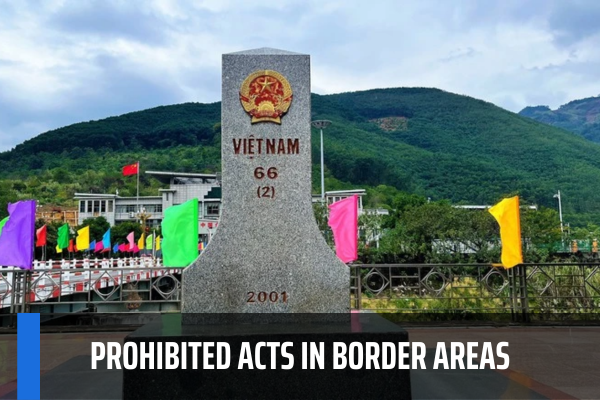Which country has the largest area in the world? What are the prohibited acts in border areas of Vietnam?
Which country has the largest area in the world?
Which country has the largest area in the world is probably still a question for many people. To answer the question about which country has the largest area in the world, readers can refer to the following information:
Russia, full name Russian Federation, is known as the largest country in the world in terms of area. With a large area of 17,098,246 km2, Russia occupies nearly 1/8 of the Earth's continental area. Russia's territory spans across North Asia and 40% of Europe, covering a total of 11 time zones and possessing a variety of environments and terrains. The capital of Russia is Moscow.
Thanks to its vast expanse, Russia borders 14 different countries. Not only that, an interesting feature about Russia is that there is no region with a tropical climate, although humid summers prevail in the south of Russia.
Not only is the country with the largest area in the world, Russia also owns the largest terrestrial biome in the world, stretching from Europe to Asia.
Russia is a country with a large economy, with rich natural resources, especially oil, gas and minerals. Russia was also an important ally in the Soviet Bloc and a member of the Eurasian Economic Union (EAEU) and the Shanghai Security Treaty Organization (SCO).
The population of the Russian Federation at the end of 2021 is about 145 million people. Russia is the country with the fourth largest population in the world, after China, India and the United States.
Russia is a multi-ethnic country with more than 190 different ethnic groups, of which the Russian group makes up the majority with about 80% of the population. In addition, Russia is also home to a number of other ethnic minorities.
With its important history, area and geographical location, Russia plays an important role in structuring and shaping the modern world.
The above content is for reference only.

Which country has the largest area in the world? What are the prohibited acts in border areas of Vietnam? (Picture from internet)
What are the prohibited acts in border areas of Vietnam?
According to Article 14 of the Law on National Border 2003, it is stipulated as follows:
Prohibited acts:
1. Displacement or vandalism of the border markers; falsification or deviation of the national borderline; deviation of natural flow of rivers or streams at the border; destruction of the border markers;
2. Disruption of social security, order and safety in the border areas; illegal residence or cultivation at the border areas; destruction of the border works;
3. Exhaustion of water resources, causing flood, environmental pollution, violating natural resources and national interest;
4. Illegal crossing at national border; smuggling or illegal trafficking of goods, money, weapons, drugs, dangerous substances, flammable substances or explosive substances across the national border; transport of harmful cultural products and other commodities prohibited by the Government from import or export across the national border;
5. Flying into no-fly zones; propelling, ejecting, releasing or carrying across the national border in the air flying vehicles, objects, substances that harm or potentially harm national defense, security, economy or health of inhabitants, environment, air safety and social order, safety in border areas;
6. Other acts violating regulations and law regarding national border.
Accordingly, the above acts are strictly prohibited in national border areas.
What are the responsibility for management and protection of the national borders and border regions of Vietnam?
Pursuant to Article 19 of Decree 140/2004/ND-CP stipulating the responsibility for management and protection of the national borders and border regions include the following:
- The management and protection of the national borders rest with the State, agencies, organizations, the armed forces, administrations of all levels and the entire population and constitute the direct and constant responsibilities of the administrations and people in the border regions.
- Agencies, organizations and individuals have the obligation and responsibility to respect the national border lines, to strictly observe and implement the legislation on national borders; to actively participate in the protection of national borders, the maintenance of security as well as social order and safety in the border regions; to coordinate with and assist the border guards in preventing and combating acts of infringing upon the sovereignty, territory, national borders, security, social order and safety in the border regions.
- While performing the tasks of protecting the national borders, the people’s armed force units must base themselves on the functions, tasks and powers under the provisions of the Law on National Borders and law provisions on the national borders.
- The border guards constitute the core and specialized force, assuming the prime responsibility for, and coordinating with the People’s Security force, the concerned branches and localities in, activities of managing and protecting the national borders, maintaining security as well as social order and safety in the border regions.
- The navy, the Coast Guard force shall have to coordinate with the border guards in managing and protecting the national borders on the sea.
- The air-defense and air force units shall have the responsibility to manage and protect the national borders in the air and coordinate with the border guards in protecting the national borders on the sea.
- The people’s armed force units in the border regions shall have the responsibility to coordinate with the border guards, the air-defense and air force units in protecting the national borders. The Defense Ministry shall prescribe the specific scope of responsibility and regulation on coordination among forces under its management in managing and protecting the national borders.
LawNet